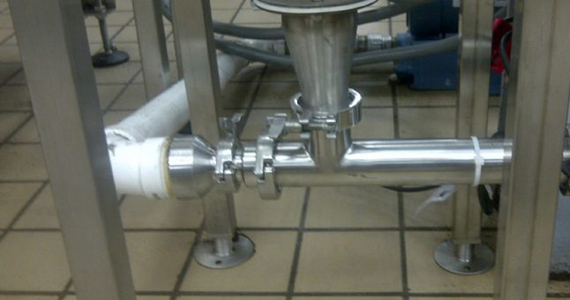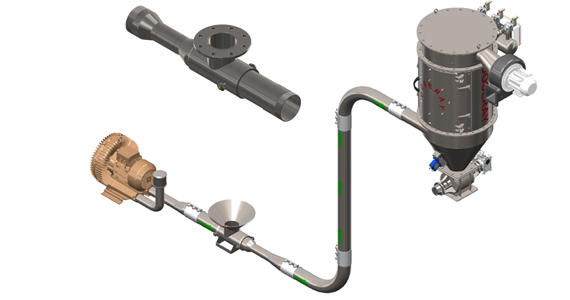WHAT IS THE VENTURI EDUCTOR - VENTURI CONVEYING?
Venturi Eductors are commonly used for pneumatically conveying
material particles in the dilute phase. This type of system creates
two effects: the suction in the feed inlet and the positive pressure
that pushes the particles into the conveying system. The eductor
introduces a driving air from a source into a nozzle. This would
eventually result in a vacuum in the suction feed that will draw the
particles into the eductor. The particles are driven by the
compressed air and passed through the diffuser,and finally
discharged into the conveying system.
Eductors are an
efficient way of feeding particles like powders, flakes, abrasives,
bulk solids, and other granular particulates. With this type of
system, maintenance cost is greatly lessened through the elimination
of the conventional rotary objects used in this application. Rotary
valves do not perform well in conveying materials with very fine and
abrasive textures and that is why venturi eductors work best for
these applications.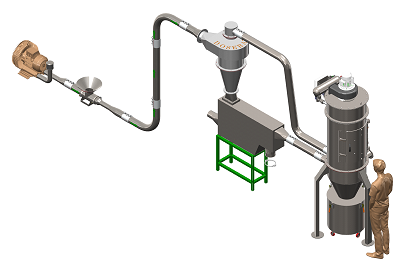
Another advantage of this type of
conveying method is that it eliminates the Blowback effect caused by
using rotary airlocks/ rotary valves. Blowback may cause several
problems in the system and these are the wear problems when
conveying fine or abrasive particles, housekeeping problems, and
explosion hazards. In addition to this, eductors also eliminate the
harmful effects a rotary valve may cause a product, thereby
minimizing the damage and degradation of the conveyed particles

Custom Engineered Designs Venturi Eductors
Venturi Eductor economical method to convey powdered or pelletized materials.Properly designed venturi eductor systems are reliable and require little maintenance. The systems are most valuable in conveying applications when the material is transported at arate less than 6000#/hr and over combined vertical and horizontal distances of up to 300 feet in totallength.Venturi eductor systems are positive pressure dilute phase pneumatic systems that can convey a variety of bulk solids materials. The venturi eductor replaces the rotary valve that is normally used as an airlock and feeds material into the pneumatic conveying line. The problem sencountered when using rotary valves,like air blow back and pellet clipping,are eliminated with the venturi eductor.
PDF
brochure

HOW DOES IT WORK VENTURI EDUCTOR?
Eductors use the
vacuum created by the venturi to introduce the bulk solids into
the conveying line. Technological advances realised by DOSERAY
will allow you to use an affordable air source provided either by
a regenerative blower or a positive displacement blower while
conveying without the need for a rotary airlock.
TeSting is
available in our lab with your products. Our eductors are fully
refundable should you not be totally satisfied with its
performance.
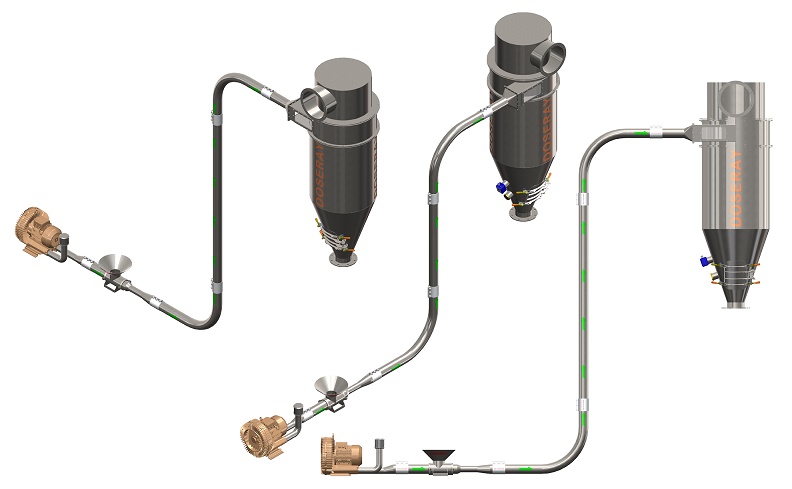
.
In the dilute phase pneumatic conveying with eductors the
Venturi effect is exploited in order to obtain a double
effect: it creates a negative pressure at the feed inlet from
which the material is sucked and then pushed into the line
pressure (pull-push).
Dilute pneumatic conveying
eductors
This results in a system with no moving parts and
characterized by a fast installation and subStitution that
makes this solution among the most economic both as an
investment and in terms of maintenance costs.
The
range of available Venturi Eductors is very large and makes
this handling system compliant with the most varied kinds of
materials and industrial processes.
However, it is of
the utmost importance that the system is designed remaining
in the operational limits to maximize the benefits of this
technology, without causing operational difficulties and
unnecessary energy costs.
FOOD PROCESSING INDUSTRY
The food processing industry uses venturi eductor based pneumatic conveying systems to drive milk and non-dairy powder spray dryers. They are also used to transport products in processes that include.
CHOOSING THE BEST CONVEYING METHOD WHEN BUILDING NEW
PLANT
Engaging experienced design experts is ideal
when implementing the installation of a pneumatic conveying
system within a new plant. They can help determine if the system
can work with venturi eductors from the start. This will avoid
having to retrofit the plant later if it was wrongly designed at
first with rotary valves or electric pumps.
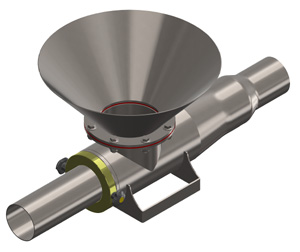
Venturi Conveyor Benefits
For example when at the discharge from a micro doser is important not to negatively affect the dosage, as in the case of back pressure generated by air leakage through a rotary valve, in the classic dilute phase pressure conveying.
Or when to download a big bag is advantageous to suck from the empty big bag to prevent loss of material in the environment on the occasion of subStitution, while maintaining a transfer of product via pneumatic pressure Conveying.
Finally we mention one of the most effective applications of use of this technology, the discharge from a cyclone separator, again thanks to the suction Venturi effect, which increases the performance of dust abatement up to 100% efficiency.
Continuous conveying
• No blow-back
• No rotary airlocks – No mechanical shearing
• No maintenance
• No Moving Parts
• Air pressure from 0,2 to 0,9 Bar
• Environmental protection
• Easy to be installed on exiSting plants
- Lebels: venturi eductor, venturi conveying, venturi ejector, venturi pneeumatic conveying, venturi transfer
